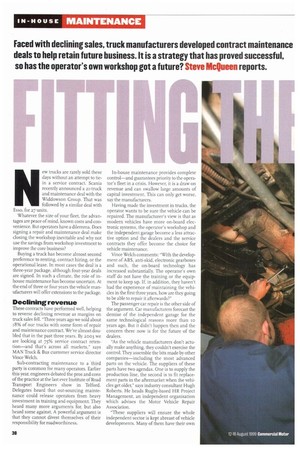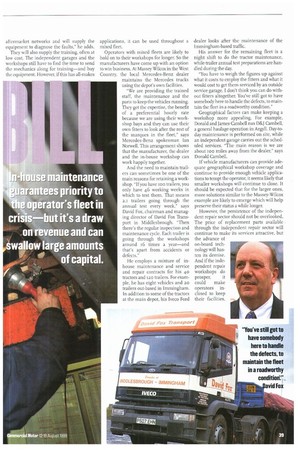Faced with declining sales, truck manufacturers developed contract maintenance deals
Page 40

Page 41

If you've noticed an error in this article please click here to report it so we can fix it.
to help retain future business. It is a strategy that has proved successful, so has the operator's own workshop got a future? Steve McQueen reports.
1.1
ew trucks are rarely sold these days without an attempt to tiein a service contract. Scania recently announced a 2i-truck and maintenance deal with the Widdowson Group. That was followed by a similar deal with Esso, for 27 units.
Whatever the size of your fleet, the advantages are peace of mind, known costs and convenience. But operators have a dilemma. Does signing a repair and maintenance deal make closing the workshop inevitable and why not use the savings from workshop investment to improve the core business?
Buying a truck has become almost second preference to renting, contract hiring, or the operational lease. In most cases the deal is a three-year package, although four-year deals are signed. In such a climate, the role of inhouse maintenance has become uncertain. At the end of three or four years the vehicle manufacturers will offer extensions to the package.
Declining revenue
These contracts have performed well, helping to reverse declining revenue as margins on truck sales fell. "Three years ago we sold about 18% of our trucks with some form of repair and maintenance contract. We've almost doubled that in the past three years. By 2003 we are looking at 75% service contract retention—and that's across all markets," says MAN Truck & Bus customer service director Vince Welch.
Sub-contracting maintenance to a 'third party is common for many operators. Earlier this year, engineers debated the pros and cons of the practice at the last ever Institute of Road Transport Engineers show in Telford. Delegates heard that out-sourcing maintenance could release operators from heavy investment in training and equipment. They heard many more arguments for, but also heard some against. A powerful argument is that they cannot divest themselves of their responsibility for roadworthiness. In-house maintenance provides complete control—and guarantees priority to the operator's fleet in a crisis. However, it is a draw on revenue and can swallow large amounts of capital investment. This can only get worse, say the manufacturers.
Having made the investment in trucks, the operator wants to be sure the vehicle can be repaired. The manufacturer's view is that as modem vehicles have more on-board electronic systems, the operator's workshop and the independent garage become a less attractive option and the dealers and the service contracts they offer become the choice for vehide maintenance.
Vince Welch comments: With the development of ABS, anti-skid, electronic gearboxes and such, the on-board technology has increased substantially. The operator's own staff do not have the training or the equipment to keep up. If, in addition, they haven't had the experience of maintaining the vehicles in the first three years, how are they going to be able to repair it afterwards?"
The passenger car repair is the other side of the argument. Car manufacturers forecast the demise of the independent garage for the same technological reasons more than io years ago. But it didn't happen then and the concern there now is for the future of the dealers.
"As the vehicle manufacturers don't actually make anything, they couldn't exercise the control. They assemble the bits made by other companies—including the most advanced parts on the vehicle. The suppliers of these parts have two agendas. One is to supply the production line, the second is to fit replacement parts in the aftermarket when the vehicles get older," says industry consultant Hugh Roberts. He heads Rugby-based HR Project Management, an independent organisation which advises the Motor Vehicle Repair Association.
"These suppliers will ensure the whole independent sector is kept abreast of vehicle developments. Many of them have their own aftermarket networks and will supply the equipment to diagnose the faults," he adds.
They will also supply the training, often at low cost. The independent garages and the workshops still have to find the time to send the mechanics along for training—and buy the equipment. However, if this has all-makes applications, it can be used throughout a mixed fleet.
Operators with mixed fleets are likely to hold on to their workshops for longer. So the manufacturers have come up with an option to win business. At Massey Wilcox in the West Country, the local Mercedes-Benz dealer maintains the Mercedes trucks using the depot's own facilities.
"We are providing the trained staff, the maintenance and the parts to keep the vehides running. They get the expertise, the benefit of a preferential hourly rate because we are using their workshop bays and they can use their own fitters to look after the rest of the marques in the fleet," says Mercedes-Benz spokesman Ian Norwell. This arrangement shows that the manufacturer, the dealer and the in-house workshop can work happily together.
And the need to maintain trailers can sometimes be one of the main reasons for retaining a workshop. "If you have too trailers, you only have 46 working weeks in which to test them. That means 2.1 trailers going through the annual test every week," says David Fox, chairman and managing director of David Fox Transport in Middlesbrough. "Then there's the regular inspection and maintenance cycle. Each trailer is going through the workshops around 16 times a year—and that's apart from accidents or defects."
He employs a mixture of inhouse maintenance and service and repair contracts for his 40 tractors and120 trailers. For example, he has eight vehicles and 2o trailers out-based in Immingham. In addition to some of the tractors at the main depot, his Iveco Ford
dealer looks after the maintenance of the I mmin gham-based traffic.
His answer for the remaining fleet is a night shift to do the tractor maintenance, while trailer annual test preparations are handled during the day.
"You have to weigh the figures up against what it costs to employ the fitters and what it would cost to get them serviced by an outside service garage. I don't think you can do without fitters altogether You've still got to have somebody here to handle the defects, to main. tam the fleet in a roadworthy condition?
Geographical factors can make keeping a workshop more appealing. For example, Donald and James Cambell run D&J Cambell, a general haulage operation in Argyll. Day-today maintenance is performed on site, while an independent garage carries out the scheduled services. "The main reason is we are about too miles away from the dealer," says Donald Cambell.
If vehicle manufacturers can provide adequate geographical workshop coverage and continue to provide enough vehicle applications to tempt the operator, it seems likely that smaller workshops will continue to close. It should be expected that for the larger ones, more solutions similar to the Massey-Wilcox example are likely to emerge which will help preserve their status a while longer.
However, the persistence of the independent repair sector should not be overlooked. The price of replacement parts available , through the independent repair sector will continue to make its services attractive, but
the advance of on-board tech
nology will has
ten its demise. And if the inde pendent repair workshops do prosper, it could make operators inclined to keep their facilities.








































































































